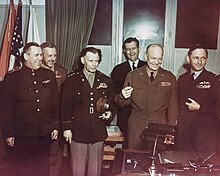Harry C. Butcher
Harry Cecil Butcher | |
|---|---|
 Senior Allied commanders at Reims, France, on 7 May 1945, shortly after the Germans had signed the surrender document, including Harry C. Butcher standing behind General Dwight D. Eisenhower | |
| Born | November 1, 1901 Springville, Iowa, United States |
| Died | April 20, 1985 (aged 83) Santa Barbara, California, United States |
| Allegiance | |
| Service/ | |
| Years of service | 1939–1945 |
| Rank | Captain |
| Battles/wars | World War II |
| Other work | Broadcaster Radio & television consultant |
Harry Cecil Butcher (November 1, 1901 – April 20, 1985) was an American radio broadcaster who served during World War II as the Naval Aide to General Dwight D. Eisenhower from 1942 to 1945.
Early life
Harry C. Butcher was born in Springville, Iowa on November 1, 1901. Following his graduation from Iowa State College, in 1929 Butcher began a career in radio broadcasting.[1] He opened the Washington, D.C. office of CBS and served as its director until 1932. Beginning in 1932, he was the manager, and later vice-president, of the CBS Radio Network's station in Washington, D.C. station WJSV. While there, Butcher coined a term for President Franklin Roosevelt's radio speeches to the American public, used by Robert Trout introducing the president's address on March 12, 1933, and again by Butcher written in a press release, referring to the May 7, 1933 address as a "fireside chat".[2][3]
Military career

During his tenure at WJSV, Butcher was commissioned a Lieutenant Commander in the United States Navy Reserve (U.S.N.R.) on September 16, 1939. From 1942 to 1945, Butcher served as the Naval Aide to General Dwight D. Eisenhower.[4] On May 1, 1943, Butcher was promoted to the rank of commander in the U.S.N.R. On November 1, 1944 he was promoted to the temporary rank of captain. Following an order given to him by Eisenhower, Butcher kept a diary of his and Eisenhower's wartime activities. The diary would come to be published in 1946 under the title "My Three Years with Eisenhower." It also led to historian Max Hastings referring to him as "the embodiment of all gossip-ridden staff officers".[5]
It was Butcher who preserved the written statement that Eisenhower had prepared in the event that the D-Day invasions failed.[6]
Later life
Butcher returned to the broadcasting world following the end of WWII. From 1946 to the 1970s, Butcher owned the radio station KIST in Santa Barbara, California.[7] He also served as president of Santa Barbara's cable TV corporation and as a radio/television consultant.
On April 20, 1985, Butcher died in Santa Barbara, California, United States.
References
- ^ "Backstage with Butcher". Time Magazine. May 6, 1946. Archived from the original on February 19, 2011. Retrieved April 28, 2009.
- ^ Buhite, Russell D.; Levy, David W., eds. (1992). FDR's Fireside Chats. University of Oklahoma Press. p. xv.
- ^ "Fireside chats". Encyclopedia of Political Communication. SAGE. 2008. pp. 243–244.
- ^ Butcher, Harry C. (1946). My Three Years With Eisenhower. New York: Simon and Schuster. p. xiii.
- ^ Hastings, Max (1985). Overlord: D-Day and the Battle for Normandy 1944. London: Pan Books. p. 268. ISBN 9780330286916.
- ^ Butcher, Harry C. (1946). Three Years with Eisenhower. London: William Heinemann Ltd. p. 525.
- ^ "Butcher, Harry C.: Papers, 1910–1959" (PDF). Dwight D. Eisenhower Presidential Library. p. 4. Retrieved 26 October 2023.
External links
- Articles with short description
- Short description is different from Wikidata
- Articles with FAST identifiers
- Articles with ISNI identifiers
- Articles with VIAF identifiers
- Articles with GND identifiers
- Articles with J9U identifiers
- Articles with LCCN identifiers
- Articles with NKC identifiers
- Articles with NTA identifiers
- Articles with PLWABN identifiers
- Articles with Trove identifiers
- Articles with NARA identifiers
- Articles with SNAC-ID identifiers
- Articles with SUDOC identifiers
- 1901 births
- 1985 deaths
- People from Linn County, Iowa
- Iowa State University alumni
- Radio personalities from Iowa
- American businesspeople in mass media
- Military personnel from Iowa
- 20th-century American naval officers
- United States Navy personnel of World War II
- American diarists
- Dwight D. Eisenhower
- Military personnel from Santa Barbara, California
- 20th-century diarists